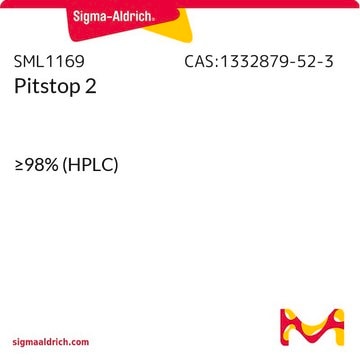SAE0087
Filipin III ready made solution
from Streptomyces filipinensis, 1mg/ml in DMSO based solution
Synonim(y):
Filipin III solution
Zaloguj sięWyświetlanie cen organizacyjnych i kontraktowych
About This Item
Kod UNSPSC:
12352200
NACRES:
NA.77
Polecane produkty
Poziom jakości
Próba
≥95% (HPLC)
Postać
ready-to-use solution
warunki przechowywania
protect from light
Warunki transportu
dry ice
temp. przechowywania
−20°C
Powiązane kategorie
Opis ogólny
Filipin III is a polyene macrolide antibiotic and the major component isolated from cultures of S. filipinensis. 1 Due to its ability to fluoresce and bind to cholesterol, Filipin has been widely
used as a probe for sterol location in biological membranes 2 and has been used clinically as a stain for free cholesterol in the study of Type C Niemann-Pick disease. 3 Filipin inhibits prion protein (PrP) endocytosis and causes the release of PrP from the plasma membrane. 4 Filipin III was found to trigger signaling responses in tobacco cells, including a NADPH oxidase-dependent production. 5. The antifungal mechanism of action may be due to altering membrane permeability and associated functions by binding to membrane sterols. Filipin inhibits prion protein (PrP) endocytosis and causes the release of PrP from the plasma membrane.
used as a probe for sterol location in biological membranes 2 and has been used clinically as a stain for free cholesterol in the study of Type C Niemann-Pick disease. 3 Filipin inhibits prion protein (PrP) endocytosis and causes the release of PrP from the plasma membrane. 4 Filipin III was found to trigger signaling responses in tobacco cells, including a NADPH oxidase-dependent production. 5. The antifungal mechanism of action may be due to altering membrane permeability and associated functions by binding to membrane sterols. Filipin inhibits prion protein (PrP) endocytosis and causes the release of PrP from the plasma membrane.
Zastosowanie
Filipin has been used in a double staining procedure as a probe for the detection of lipoproteins in polyacrylamide gel and immobilized on nitrocellulose membranes. It is also widely used to localize and quantitate unesterified cholesterol by virtue of a specific fluorescent complex.
Inne uwagi
- Filipin III solution is very sensitive to air and light. Upon receipt aliquot and store at -20°C avoid freeze thaw cycles.
- Filipin III is used in various concentrations depending on the specific protocol used. Dilute 1mg/ml stock solution with appropriate buffer according to the used protocol.
- Filipin III interaction with cholesterol alters the absorption and fluorescence spectra, for visualization with a fluorescence microscope use excitation at 340-380 nm and emission at 385-470 nm (Filipin fluorescent staining photo-bleaches very rapidly, thus the sample should be analyzed immediately).
This page may contain text that has been machine translated.
Kod klasy składowania
10 - Combustible liquids
Klasa zagrożenia wodnego (WGK)
WGK 1
Temperatura zapłonu (°F)
188.6 °F
Temperatura zapłonu (°C)
87 °C
Certyfikaty analizy (CoA)
Poszukaj Certyfikaty analizy (CoA), wpisując numer partii/serii produktów. Numery serii i partii można znaleźć na etykiecie produktu po słowach „seria” lub „partia”.
Masz już ten produkt?
Dokumenty związane z niedawno zakupionymi produktami zostały zamieszczone w Bibliotece dokumentów.
Klienci oglądali również te produkty
Yun-Qi Zhou et al.
Emerging microbes & infections, 11(1), 1135-1144 (2022-03-29)
The spread of severe acute respiratory syndrome coronavirus 2 (SARS-CoV-2) and its variants is threatening public health around the world. Endocytosis functions as an important way for viral infection, and SARS-CoV-2 bears no exception. However, the specific endocytic mechanism of
Pan Gao et al.
Investigative ophthalmology & visual science, 63(5), 32-32 (2022-05-27)
Bietti crystalline dystrophy (BCD) is a progressive retinal degenerative disease primarily characterized by numerous crystal-like deposits and degeneration of retinal pigment epithelium (RPE) and photoreceptor cells. CYP4V2 (cytochrome P450 family 4 subfamily V member 2) is currently the only disease-causing
Nina H Pipalia et al.
Journal of lipid research, 47(2), 284-301 (2005-11-17)
Niemann-Pick disease type C (NPC) is an autosomal recessive genetic disorder manifested by abnormal accumulation of unesterified cholesterol and other lipids. We screened combinatorially synthesized chemical libraries to identify compounds that would partially revert cholesterol accumulation. Cultured CHO cells with
M A Castanho et al.
The Journal of biological chemistry, 267(1), 204-209 (1992-01-05)
The alterations in the absorption and fluorescence spectra observed for the polyene antibiotics filipin and nystatin in the presence of cholesterol are due to an exciton interaction (polyene aggregates) and cannot be attributed to a specific sterol-antibiotic complex. Filipin and
Filipin, an Antifungal Antibiotic: Isolation and Properties
George B. Whitfield, Thomas D. Brock, Alfred Ammann, David Gottlieb, and Herbert E. Carter
Journal of Chemical and Pharmaceutical Sciences
, 4799-4801 (1955)
Nasz zespół naukowców ma doświadczenie we wszystkich obszarach badań, w tym w naukach przyrodniczych, materiałoznawstwie, syntezie chemicznej, chromatografii, analityce i wielu innych dziedzinach.
Skontaktuj się z zespołem ds. pomocy technicznej














